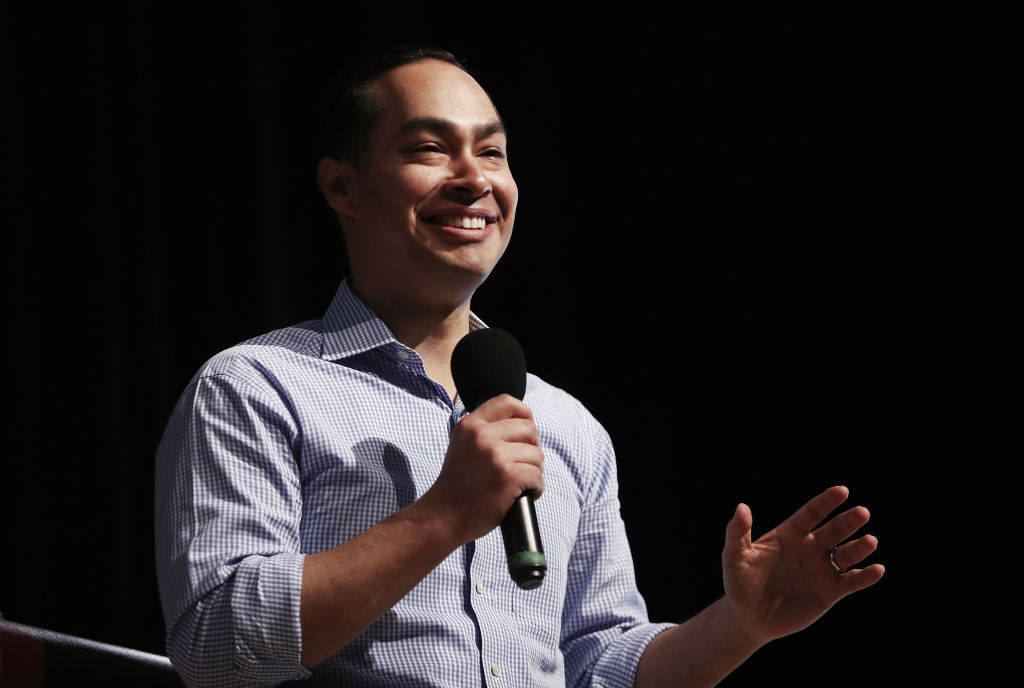Decriminalizing illegal immigration and 3 other 'radical' ideas in Julián Castro's new immigration plan


A free daily email with the biggest news stories of the day – and the best features from TheWeek.com
You are now subscribed
Your newsletter sign-up was successful
Julián Castro, a 2020 Democratic presidential hopeful, has largely flown under the radar in the early stages of the primary. But the former Housing Secretary under the Obama administration, whose grandmother emigrated from Mexico to the United States in the 1920s, unveiled a "People First" immigration platform on Tuesday with some hard policy points that could create some shock waves.
Here are four key ideas from Castro's "radical" proposal.
Decriminalize all immigration — Castro writes that in 2005, the Bush administration decided to charge those crossing the border illegally with criminal charges rather than civil ones. Castro would reverse this, decriminalizing immigration and instead treating each case as a civil one.
The Week
Escape your echo chamber. Get the facts behind the news, plus analysis from multiple perspectives.

Sign up for The Week's Free Newsletters
From our morning news briefing to a weekly Good News Newsletter, get the best of The Week delivered directly to your inbox.
From our morning news briefing to a weekly Good News Newsletter, get the best of The Week delivered directly to your inbox.
Central American "Marshall Plan" — Castro also called for a "21st century Marshall Plan" for Central America, predicting investments in the region would help stabilize and decrease violence in the nations that are currently major drivers of migration to the United States. He also writes that such a plan would boost U.S. economic growth. The Trump administration recently cut aid funding to El Salvador, Honduras, and Guatemala.
Splitting ICE in half — As opposed to abolishing Immigration and Customs Enforcement, Castro would reconstitute it, leaving national security measures such as human and drug traffic and anti-terrorism units within the Department of Homeland Security. Immigration enforcement, then, would be reassigned to other agencies to "increase oversight and raise standards."
End the three and ten-year bars — Castro would also seek to do away with re-entry rules for undocumented individuals who leave the U.S. and want to re-enter legally. Currently, those who accrue more than 180 days of "unlawful presence" in the U.S. are barred from re-entry for three years, while those accrue more than one year cannot return for ten. Read Castro's full post on Medium.
A free daily email with the biggest news stories of the day – and the best features from TheWeek.com
Tim is a staff writer at The Week and has contributed to Bedford and Bowery and The New York Transatlantic. He is a graduate of Occidental College and NYU's journalism school. Tim enjoys writing about baseball, Europe, and extinct megafauna. He lives in New York City.
-
 Why is the Trump administration talking about ‘Western civilization’?
Why is the Trump administration talking about ‘Western civilization’?Talking Points Rubio says Europe, US bonded by religion and ancestry
-
 Quentin Deranque: a student’s death energizes the French far right
Quentin Deranque: a student’s death energizes the French far rightIN THE SPOTLIGHT Reactions to the violent killing of an ultraconservative activist offer a glimpse at the culture wars roiling France ahead of next year’s elections
-
 Secured vs. unsecured loans: how do they differ and which is better?
Secured vs. unsecured loans: how do they differ and which is better?the explainer They are distinguished by the level of risk and the inclusion of collateral
-
 Labor secretary’s husband barred amid assault probe
Labor secretary’s husband barred amid assault probeSpeed Read Shawn DeRemer, the husband of Labor Secretary Lori Chavez-DeRemer, has been accused of sexual assault
-
 Trump touts pledges at 1st Board of Peace meeting
Trump touts pledges at 1st Board of Peace meetingSpeed Read At the inaugural meeting, the president announced nine countries have agreed to pledge a combined $7 billion for a Gaza relief package
-
 NIH director Bhattacharya tapped as acting CDC head
NIH director Bhattacharya tapped as acting CDC headSpeed Read Jay Bhattacharya, a critic of the CDC’s Covid-19 response, will now lead the Centers for Disease Control and Prevention
-
 Witkoff and Kushner tackle Ukraine, Iran in Geneva
Witkoff and Kushner tackle Ukraine, Iran in GenevaSpeed Read Steve Witkoff and Jared Kushner held negotiations aimed at securing a nuclear deal with Iran and an end to Russia’s war in Ukraine
-
 Pentagon spokesperson forced out as DHS’s resigns
Pentagon spokesperson forced out as DHS’s resignsSpeed Read Senior military adviser Col. David Butler was fired by Pete Hegseth and Homeland Security spokesperson Tricia McLaughlin is resigning
-
 Judge orders Washington slavery exhibit restored
Judge orders Washington slavery exhibit restoredSpeed Read The Trump administration took down displays about slavery at the President’s House Site in Philadelphia
-
 Hyatt chair joins growing list of Epstein files losers
Hyatt chair joins growing list of Epstein files losersSpeed Read Thomas Pritzker stepped down as executive chair of the Hyatt Hotels Corporation over his ties with Jeffrey Epstein and Ghislaine Maxwell
-
 Judge blocks Hegseth from punishing Kelly over video
Judge blocks Hegseth from punishing Kelly over videoSpeed Read Defense Secretary Pete Hegseth pushed for the senator to be demoted over a video in which he reminds military officials they should refuse illegal orders
